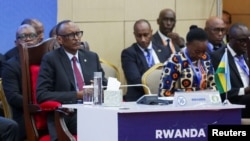A summit of African leaders meeting to address the crisis in the Democratic Republic of Congo on Saturday called for an "immediate and unconditional ceasefire" within five days.
The M23 armed rebel group has rapidly seized swathes of territory in the mineral-rich eastern DRC in an offensive that has left thousands dead and displaced vast numbers.
The DRC government has officially designated the M23 rebel group as a terrorist organization, while the United Nations and the United States classify it as an armed rebel group.
The summit in Tanzania brought together Rwandan President Paul Kagame and his Congolese counterpart, Felix Tshisekedi, as well as leaders from the East African Community bloc and 16-member Southern African Development Community.
Kagame appeared in person, while Tshisekedi joined via video call.
In the final statement, the summit called for army chiefs from both communities "to meet within five days and provide technical direction on an immediate and unconditional ceasefire."
It also called for the opening of humanitarian corridors to evacuate the dead and injured.
Meanwhile, fighting was ongoing about 60 kilometers from the South Kivu provincial capital of Bakuvu, local and security sources told AFP.
The M23 took the strategic city of Goma, capital of North Kivu province, last week and is pushing into neighboring South Kivu in the latest episode of decadeslong turmoil in the region.
Local fears
Since the M23 reemerged in 2021, peace talks hosted by Angola and Kenya have failed and multiple ceasefires have collapsed.
While Rwanda continues to deny supporting the M23 militarily, a report by United Nations experts said last year Rwanda had around 4,000 troops in the DRC and profited from smuggling out of the country vast amounts of gold and coltan — a mineral vital for phones and laptops.
Rwanda accuses the DRC of sheltering the Democratic Forces for the Liberation of Rwanda, an armed group created by ethnic Hutus who massacred Tutsis during the 1994 Rwandan genocide.
The summit comes amid reports that the M23 is closing on the town of Kavumu in South Kivu, which hosts an airport critical to supplying Congolese troops.
There have also been reports of panic in the provincial capital, Bukavu, as residents board up shops and seek to escape.
"The border with Rwanda is open but almost impassable because of the number of people trying to cross. It's total chaos," they said.
Gang rape, slavery
U.N. rights chief Volker Turk warned Friday: "If nothing is done, the worst may be yet to come for the people of the eastern DRC but also beyond the country's borders."
Turk said that nearly 3,000 people had been confirmed killed and 2,880 wounded since the M23 entered Goma on Jan. 26, and that the final tolls were likely to be much higher.
He also said his team was "currently verifying multiple allegations of rape, gang rape and sexual slavery."
M23 has already installed its own mayor and local authorities in Goma.
It has vowed to march all the way to the national capital, Kinshasa, even though the city lies about 1,600 kilometers away across the vast country, which is roughly the size of Western Europe.
The DRC army, which has a reputation for poor training and corruption, has been forced into multiple retreats.
The M23 offensive has raised fears of a regional war, given that several countries are supporting the DRC militarily, including South Africa, Burundi and Malawi.




